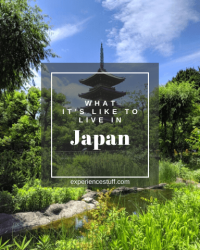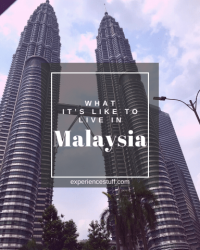Discover the truth about Thailand: Inside Tips from a Livability Expert
This post will show you what living in Thailand is like.
It covers:
- Housing
- Food
- People
- Budget
- Things to do
- and more!
I spent a year living in Chiang Mai and Bangkok. Here’s what I found!

Thailand is the top digital nomad starter country. It has everything you could hope for, friendly people, nice weather, delicious food, and decent infrastructure. If you don’t like working remotely in Thailand, the digital nomad or slow travel lifestyle probably isn’t for you.
Thailand is the only country in Southeast Asia that wasn’t colonized by Europeans. In many ways, their culture remains mostly traditional. Much of the westernization occurred to build up tourism and the economy.

I’ve been going to Thailand since 2006. Living there on and off for one year in Bangkok and Chiang Mai has been a highlight of my life abroad. I’ve also visited numerous cities including Chiang Rai, Krabi and Phuket. Avoiding the touristy areas is key to having a good experience in Thailand
Brief History

People have been living in the area we now call Thailand for at least 20,000 years. It was part of the Funan Kingdom from 50 AD to 627 AD, most likely inhabited by Mon/Khmer (Cambodian) ethnicities. Control of the region changed hands from Mon to Khmer to Malayan, which were all strongly influenced by India, until the 11th century when the Tai people arrived.
Although mentions of Tai people date back to 6th century BC, their origin is debatable. Some think they came from Southwestern China; others believe they’re from Laos and Cambodia. The main connection they have with modern Thai people is a language with similar linguistic roots.
Tai were first mentioned in Southeast Asia on a 12th century inscription in Ankor Wat. In the Khmer Empire, where Tais were a vassal group, they were called “Syam” or dark-people. This explains why some have used the term “Siam” to describe them.
Around 1240, a local Tai chieftain in the valley of the Mae Nam River in central Thailand, Pho Khun Bang Klang Hao, led a rebellion against the Khmer Empire, establishing himself as the first king of Sukhothai Empire.
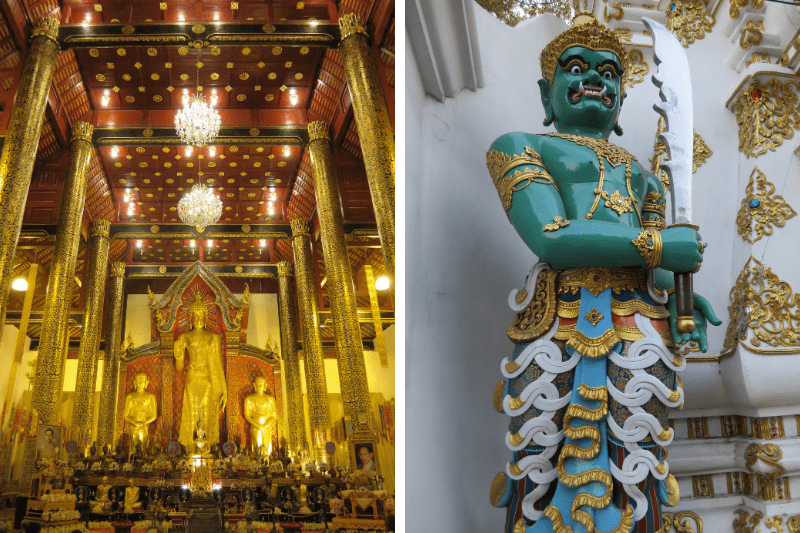
In the north, Mangrai established the Lan Na Kingdom (Chiang Mai area), which became a strong empire that competed with the southern kingdom until 1545 when they were assimilated into one kingdom.
The Sukhothai Kingdom expanded and was eventually replaced by the Ayutthaya, which became the dominant power throughout the 14th and 15th centuries. They even defeated Ankor, causing the decline of its empire.
Contact with the west began in 1511 with a Portuguese diplomatic mission.
For many centuries, Ayutthaya battled the Burmese for control of the region while repelling Chinese invasions until their empire was destroyed in 1767. Taksin and Chakri, expelled the Burmese a few years later and reunified the country under the Chakri Dynasty.

Chakri established his new capital in Bangkok in 1782. He was later given the title of Rama I (you’ll see his statue all over the city) and became the first king of the Chakri dynasty, which is still the ruling dynasty today.
Later, Thailand was able to keep its independence from western colonization in the 19th century for a few reasons. They negotiated openly with the European powers and adopted reforms to modernize their country. Thais also kept their sovereign status by becoming a buffer state between the British who controlled Burma and Malaysia, and French who controlled Indochina. Ultimately, they had to give up control of Cambodia and Laos to the French and Northern Malay states to the British.
Thailand’s economy, military and political system changed a lot in the 20th century. Wealthy students who traveled abroad brought new ideas to the country. The military and civil servants orchestrated a bloodless Coup in 1932, forming a constitutional monarchy.
***Disclaimer***
This post is based on my experiences as an off-white westerner who has been living abroad since 2006. How you’re treated depends on who you are, how you behave and which street you’re on. Experiences may vary.
Living conditions in Thailand

- Weather is hot and humid in the South and cooler and drier in the North. Chiang Mai weather feels like southern California. The rainy season depends on the region. It runs from May to Oct in most areas and starts a bit later in the southeastern islands including Koh Samui and Koh Pagnan. I never felt inconvenienced by the weather since it usually rained a lot for a few hours then stopped.
- Internet is fast and cheap all over with the exception of the southeastern islands.
- Transportation outside of Bangkok leaves a lot to be desired. Bangkok has a nice BTS and MRT that runs along the main streets. You can even catch a ride on a river taxi. There are bus stops all over Chiang Mai where buses don’t ever stop, because they don’t exist. This is mostly because the local tuk tuk mafia demanded to be a part of the service and sabotaged it from within. Up until 2016, you’d have to hail a Songthaew or Baht Bus which is basically a flatbed truck with a cover. Now you can call a Grab taxi which costs a bit more, but is far more convenient.
- Safety is not an issue in most areas, as long as you avoid seedy places. There is tremendous wealth inequality in the country so keep in mind that your income, while normal at home, might be 10 times what the average Thai earns. Locals are well-aware of this gap, but don’t make things worse by flashing expensive brands around. There are super rich Thais who control more wealth than you’d imagine too, but you won’t see them sunbathing at the beach.
- Water is not considered safe to drink from the tap unfortunately. I recommend buying bottled water. There are refill stations operated by the government that provide clean water. I’ve made the mistake of drinking the free water at some very nice cafes and regretted it every time. Ice you find in drinks can also be questionable. The hollow cylindrical variety is usually regulated and clean, although that is up for much debate.
- Sanitation is not Thailand’s strong suit. Expect to see pollution in all forms throughout the country.
- Groceries can be bought cheap and fresh at day and night open air markets. Large grocery chains like BigC even deliver, but expect to pay more for the same things you can find at the local stores. Also, you will pay a premium for anything imported, because the government adds a huge tax.
Housing
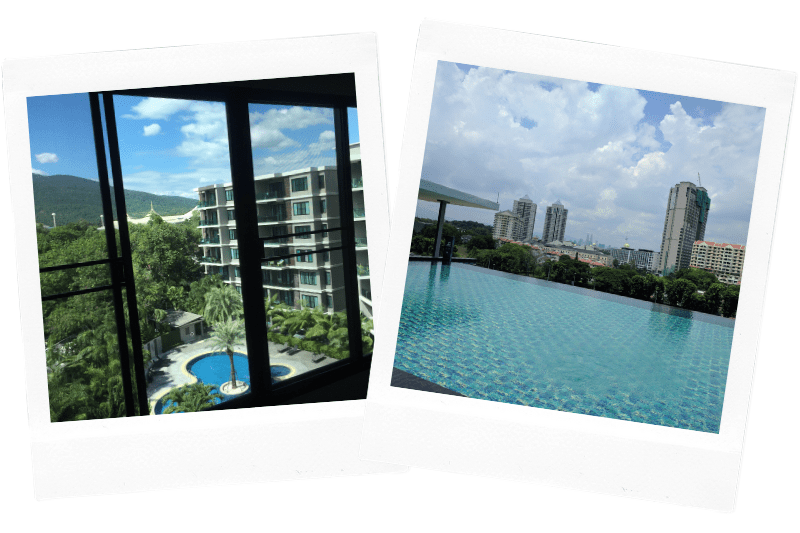
Housing varies greatly in quality. You will pay a premium for Western standards. Thais build luxury condos every year, so I don’t recommend buying one. They usually go down in value due to lack of maintenance and locals buying new condos instead of buying old ones. Don’t expect to resell your condo, because locals won’t buy from foreigners.
Condos tend to be smaller in Bangkok since many of them are designed by Japanese architects. Most luxury condos in Bangkok and Chiang Mai come with a gym and pool but are often filled with tourists.
Food

Pad Thai and Khao soi | Pineapple fried rice | Guacamole cone | Iced coffee and butterfly pea flower tea lemonade
Thailand is a spicy food-lovers paradise. Thai cuisine uses sweet, sour and salty flavors perfectly. The food is a wonderful mix of local tradition, and cuisines from the surrounding region. Thais can cook virtually anything and with the many expat-run restaurants, so you can enjoy authentic Japanese, Chinese, Italian and Mexican. Burmese food, especially in the north, is also easy to get and delicious.
People

Sabai sabai (relaxed or comfortable) is the word to remember.
If you visit Thailand and only go to Khao San Road, you might not be impressed. Those who cater to tourists, can be pushy and sales-oriented. It’s no surprise, because tourism makes up nearly 20% of the country’s economy. They’re definitely not representative of the entire populace. You’ll fall in love with Thai people once you check out local neighborhoods. People are really welcoming long as you’re not drunk and disrespectful.
I do not recommend getting into a fight with a local, because you will soon be facing three generations of extended family and you will lose. Outside of the touristy areas, I never had a problem.
Even in Bangkok, which is a megacity of 8 million, everyone is surprisingly relaxed in bumper-to-bumper rush hour traffic.
People outside of the big cities are actually quite conservative.
Life in Bangkok is hard for Thai people. Office work requires long hours and long commutes. Management structure is very much top-down with the boss being unquestionable. There is some petty crime like pickpocketing and stealing wallets and phones, but you’ll be safe virtually everywhere.
Service quality is generally good with hospitality being a focus. Some of the details might get lost in translation, but it’s important to be understanding. I’m not surprised or annoyed if my order is a bit off, because it’s usually delicious.
Cost of living

Cost of living can be surprisingly high if you want to have a modern house and eat something other than Thai food. You can get a place for 200 USD a month that will be a dark one room shoe box or 1,000 USD a month for a luxury resort style condominium. I actually spent one of the highest amounts on living costs in Bangkok because there were so many cool restaurants and things to do that I was going out all the time.
Budget

$500 USD to $2,000 USD a month depending on whether you live like a local or like a farang.
Unique experiences

Sights
Bangkok is full of high-rise buildings, condos and traffic. You’ll see tuk tuks and songthaews along with new cars from Japan.
The country is covered by lush green and dotted with limestone mountains near the coasts.
Palaces and temples are visible all over the country with gold and other vivid colors.

Sounds
Thais are generally quiet, but the city can be loud with motorbikes and ambient music. Karaoke is very loud in the countryside, and happens at all hours of the night. You also might be treated to a midnight funeral lasting 24 hours complete with an MC and DJ.
Local music is lively and fun. I actually enjoy their variations of trot and trap songs. They have a pretty good indie rock scene too.
Cafes are often quiet except for the tourists. Expect to hear a lot of Bossa Nova.
Smells
Many parts of Thailand smell like Jasmine, and diesel fuel.
You will also enjoy some wonderful aromas like Lemongrass and Galangal.
Things to do
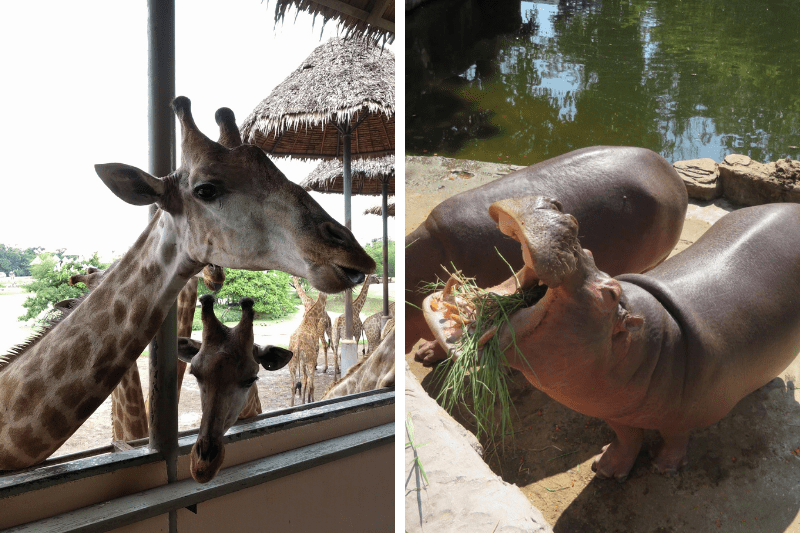
Thailand is bittersweet for animal lovers. On the one hand you can get up close and personal in ways you can’t in western countries. On the other hand, you become aware of how poorly animals are treated. I’ve been able to feed Hippos, Panthers and Giraffes and pet crocodiles. There are places that treat elephants well. The key thing to remember is, if they let you ride an elephant, it’s not a sanctuary.
Take a cooking class even if you don’t like to cook. They’ll show you how to shop at local markets and make delicious and healthy Thai food at home. The money and effort were well-worth it since I make Thai food once a week now.

Check out a Muay Thai show, preferably at a major stadium, even if you aren’t into martial arts. You can get a feel for Thai culture and have a great time. Don’t buy VIP tickets and just sit with the locals. You can even take private lessons for 30 USD and hour.
You can do pretty much any outdoor activity in Thailand. They have everything from white water rafting to firing ranges. Safety and quality will be proportional to what you pay.
Watching a movie in Thailand is always a unique experience. They play a short one-minute video honoring the King and his accomplishments. It’s important that you stop eating popcorn and stand at attention to show respect. I don’t know what happens if you don’t, but someone can report you to the police.
Check out one of the many festivals like Songkran and have a city-wide water fight. Or Loy Krathong and treat yourself to a spectacle of lights.
Take a ride on the Chao Prayo river and check out the palaces and temples in Bangkok.
Visit Ayutthaya to see what the previous kingdom looked like.
Go to a local festival in a smaller city. People gather in the center of town and dance in a circle. You can see what Thai people are like outside the cities. The food is absolutely delicious and cheap too.
Explore abandoned New World Mall in Bangkok. The entire mall has been left to let nature reclaim it. A very eerie and cool experience.
Rating
Difficulty: ★★★☆☆☆☆☆☆☆ (3/10)
Tourism industry is very developed and most people in hospitality speak English.
Live: ★★★★★★☆☆☆☆ (6/10)
It would be 9/10 if it weren’t for the increasing levels of air pollution, especially in Chiang Mai.
Visit: ★★★★★★★☆☆☆ (8/10)
No matter who you are or what you’re into, Thailand has something for everyone.
Did we miss anything?
Thailand is a place you have to see to believe.
Let us know your Thailand tips below!





